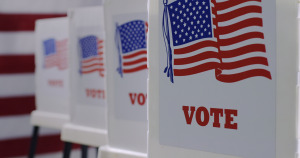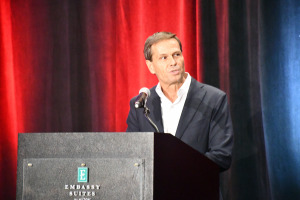
Ad agency titans Omnicom, Interpublic to form $30B marketing powerhouse
Omnicom is buying Interpublic Group in a stock-for-stock deal that will create the largest ad agency in the world with combined annual revenue of almost $26 billion.

Omnicom is buying Interpublic Group in a stock-for-stock deal that will create the largest ad agency in the world with combined annual revenue of almost $26 billion.

New CEO Stacy Sommer, a former executive at San Francisco public relations firm Edelman, was hired by TrendyMinds in January.

Democrat attorney general candidate Destiny Wells went on the attack in advertisements launched last week, prompting rebuke from GOP incumbent Todd Rokita.

The marketing tech firm, which counts some of America’s largest retailers as customers, is now working to replicate that success overseas.

The original version of the ad circulated to television stations “mistakenly” omitted a required disclaimer that labeled the advertisement as altered, according to Sen. Mike Braun’s campaign.

The government’s case alleges Google has built and maintained an illegal monopoly that restricts choices and inflates costs for online publishers and advertisers.

The National Federation of Independent Business said Monday it released the 30-second Indiana ad as part of a national push to extend a 20% small business deduction.

Many customers found that repair claims were often not covered despite making payments of up to $120 per month, the FTC said Wednesday. The FTC also alleged that CarShield’s celebrity and consumer endorsers made false statements in its ads.

Chrome is the world’s dominant web browser, and many others, including Microsoft’s Edge, are based on the company’s Chromium technology.

Fishers-based Vibenomics has signed a deal with home improvement retailer Lowe’s, which is using Vibenomics digital advertising technology in its more than 1,700 stores nationwide.

The 34-story hotel’s facade has frequently been used to promote numerous local events and teams, but the 205-foot-tall Clark graphic for Gatorade marks the first obvious product advertisement on the building.

Many Division I schools expect their athletic budgets to be stressed by the House v. NCAA settlement, which would require back damages of $2.77 billion to be paid over 10 years to athletes.

Sources say the contract spans eight years and includes a signature shoe.

Indianapolis-based Chip Ganassi Racing’s No. 8 car will be painted in the texture of an unfrosted Pop-Tart along with images of Seinfeld and some of the movie cast members to promote the film.

The sweeping bipartisan proposal would for the first time give consumers broad rights to control how tech companies like Google, Meta and TikTok use their personal data, a major breakthrough in the decades-long fight to adopt national online privacy protections.

Businesses see a big marketing opportunity in the total solar eclipse set to dim skies across North America on Monday.

A new advertisement from the Brad Chambers campaign for governor is the latest in a flurry of ads being released in the six-way Republican primary.

Dozens of companies will be promoting their brands and rolling out new merchandise at NBA All-Star Weekend events, including Under Armour, AT&T, Google, Kia, Starry, Lids, State Farm, Converse and Skims.

The city’s largest advertising agency said the eight-figure acquisition will expand its its client roster in health care, finance and energy.

U.S. Sen Mike Braun is the fourth Indiana GOP gubernatorial contender to go on air with campaign advertising.